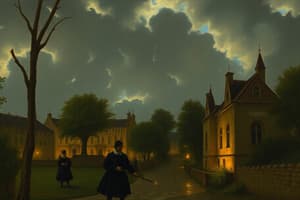Podcast
Questions and Answers
What period of time does a 2nd year history course typically cover?
What period of time does a 2nd year history course typically cover?
- The Renaissance to the Industrial Revolution (correct)
- Ancient Greece to the Roman Empire
- The Middle Ages to the Enlightenment
- The Industrial Revolution to the modern era
What is the main focus of the Renaissance and Humanism theme?
What is the main focus of the Renaissance and Humanism theme?
- The development of modern nation-states
- The revival of classical Greek and Roman culture (correct)
- The impact of colonialism and imperialism
- The rise of Protestantism
What is the significance of the Treaty of Westphalia in 1648?
What is the significance of the Treaty of Westphalia in 1648?
- It ended the Protestant Reformation
- It established the modern nation-state system (correct)
- It led to the rise of capitalism
- It marked the beginning of the Enlightenment
Who is credited with leading the Protestant Reformation?
Who is credited with leading the Protestant Reformation?
What is the main impact of the Printing Press on society?
What is the main impact of the Printing Press on society?
What is the main theme of the Enlightenment?
What is the main theme of the Enlightenment?
What is the significance of the year 1450-1500 in 2nd year history?
What is the significance of the year 1450-1500 in 2nd year history?
Who is associated with the development of modern science?
Who is associated with the development of modern science?
Flashcards
What is the Renaissance?
What is the Renaissance?
Cultural and intellectual rebirth, rediscovering classical antiquity.
What is Humanism?
What is Humanism?
Emphasizes individual potential and achievement, shifting focus from divine to human.
What is the Reformation?
What is the Reformation?
A split in Christianity, leading to new Protestant denominations.
What is the Enlightenment?
What is the Enlightenment?
Signup and view all the flashcards
What is a Nation-State?
What is a Nation-State?
Signup and view all the flashcards
What are Colonialism and Imperialism?
What are Colonialism and Imperialism?
Signup and view all the flashcards
What is Capitalism?
What is Capitalism?
Signup and view all the flashcards
What is Impact of the Printing Press?
What is Impact of the Printing Press?
Signup and view all the flashcards
Study Notes
Overview of 2nd Year History
- Typically covers the period from the Renaissance to the Industrial Revolution (approximately 1450-1800)
- Focuses on the development of modern nation-states, the rise of capitalism, and the impact of colonialism and imperialism
Key Themes and Concepts
- Renaissance and Humanism: Revival of classical Greek and Roman culture, emphasis on individualism and human achievement
- The Protestant Reformation: Division of Christianity, rise of Protestantism, and the impact on European politics and society
- The Enlightenment: Age of Reason, scientific revolution, and the development of modern political and philosophical thought
- The Rise of Nation-States: Formation of modern nation-states, absolute monarchies, and the development of national identities
- Colonialism and Imperialism: European exploration, conquest, and exploitation of non-European regions, and the impact on indigenous populations
Key Events and Dates
- 1450-1500: Renaissance and the Age of Exploration
- 1517: The Protestant Reformation begins with Martin Luther's 95 Theses
- 1648: The Treaty of Westphalia establishes the modern nation-state system
- 1687: The Glorious Revolution in England establishes a constitutional monarchy
- 1776: The American Declaration of Independence
- 1789: The French Revolution begins
Key Figures
- Martin Luther: Leader of the Protestant Reformation
- John Locke: English philosopher and advocate for individual rights and liberties
- Voltaire: French philosopher and advocate for reason and tolerance
- Columbus: Italian explorer and colonizer of the Americas
- Napoleon Bonaparte: French military leader and emperor who shaped European politics
Historical Developments and Processes
- The Rise of Capitalism: Development of trade, commerce, and industrial production
- The Development of Modern Science: Advances in physics, mathematics, and astronomy
- The Growth of Cities: Urbanization and the rise of modern cities
- The Impact of the Printing Press: Spread of knowledge and ideas through mass production of books
Note: These notes are a general outline of the topics and themes typically covered in a 2nd year history course. The specific content and emphasis may vary depending on the course and instructor.
Overview of 2nd Year History
- Covers the period from the Renaissance to the Industrial Revolution (approximately 1450-1800)
- Focuses on the development of modern nation-states, the rise of capitalism, and the impact of colonialism and imperialism
Renaissance and Humanism
- Revival of classical Greek and Roman culture
- Emphasis on individualism and human achievement
The Protestant Reformation
- Division of Christianity
- Rise of Protestantism
- Impact on European politics and society
The Enlightenment
- Age of Reason
- Scientific revolution
- Development of modern political and philosophical thought
Rise of Nation-States
- Formation of modern nation-states
- Absolute monarchies
- Development of national identities
Colonialism and Imperialism
- European exploration and conquest
- Exploitation of non-European regions
- Impact on indigenous populations
Key Events and Dates
- 1450-1500: Renaissance and the Age of Exploration
- 1517: Martin Luther's 95 Theses, starting the Protestant Reformation
- 1648: Treaty of Westphalia establishes the modern nation-state system
- 1687: Glorious Revolution in England establishes a constitutional monarchy
- 1776: American Declaration of Independence
- 1789: French Revolution begins
Key Figures
- Martin Luther: Leader of the Protestant Reformation
- John Locke: English philosopher and advocate for individual rights and liberties
- Voltaire: French philosopher and advocate for reason and tolerance
- Columbus: Italian explorer and colonizer of the Americas
- Napoleon Bonaparte: French military leader and emperor who shaped European politics
Historical Developments and Processes
- Rise of Capitalism: Development of trade, commerce, and industrial production
- Development of Modern Science: Advances in physics, mathematics, and astronomy
- Growth of Cities: Urbanization and the rise of modern cities
- Impact of the Printing Press: Spread of knowledge and ideas through mass production of books
Studying That Suits You
Use AI to generate personalized quizzes and flashcards to suit your learning preferences.




